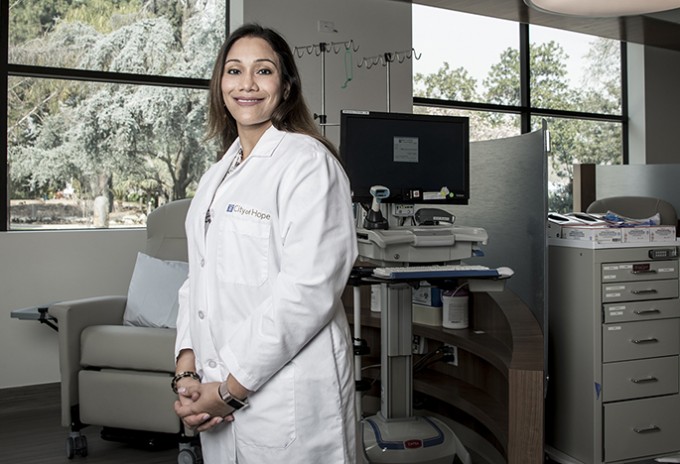My Specialty
Clinical Research Nursing, Anita Karra, City of Hope
Gathering data and managing patients enrolled in clinical trials

Anita Karra, RN, B.S.
Clinical Research Nurse, Immunotherapy Disease Team
City of Hope, Duarte
How did your nursing career begin and what types of nursing work have you done?
I began my nursing career in 2009 as a research nurse at the Hemophilia Treatment Center of Western Pennsylvania in Pittsburgh. The medical director, Margaret Ragni, M.D., MPH, took a chance by employing a new graduate nurse in this clinical research position.
Since I had worked as a data assistant at a vaccine research company while I was in nursing school, she felt I had the knowledge base and potential to succeed in the role. I went on to clinical research positions at John Hopkins Division of Pediatric Hematology; Dowling Apheresis Clinic at the NIH Clinical Center; the Murtha Cancer Center at Walter Reed National Military Medical Center; Virginia Cancer Specialists; and then City of Hope.
Where did your interest in research come from?
After I finished nursing school, I wanted to become a clinical research nurse so that I could actively participate in helping patients access novel therapies. I became fascinated with the way clinical trial patient data drives the FDA approval process for pharmaceutical companies. It was very informative to see firsthand how children enrolled in vaccine clinical trials contribute to new therapies coming to market.
The drug development process for FDA approval of a new drug is quite rigorous and important, as it brings drugs to market. Basic science determines whether to move forward from the discovery of an agent to preclinical testing utilizing animals and then to human clinical trials.
Tell us a little about your role.
As a CRN, I manage patients involved in human clinical research. Depending on the outcome of clinical trials, data may be submitted to the FDA for the approval or rejection of new drugs. Clinical research nurses need to be cognizant of the importance of gathering accurate data and ensuring that patients stay in compliance with the clinical trial protocols, which are very data-driven and have tight submission timelines.
Keeping HIPAA in mind, is there a patient story you can share to illustrate this process?
I had a multiple myeloma patient who had been through at least 23 lines of treatment before she enrolled in a CAR-T trial. CAR-T (chimeric antigen receptor T-cell) therapy is an exciting new technique that collects a patient’s own cells and genetically modifies them to kill the patient’s cancer. The patient entered the trial with high hopes of clearing all her disease. However, her clinical trial journey was complicated by aggressive disease and issues with the manufacturing of her specific CAR-T product.



